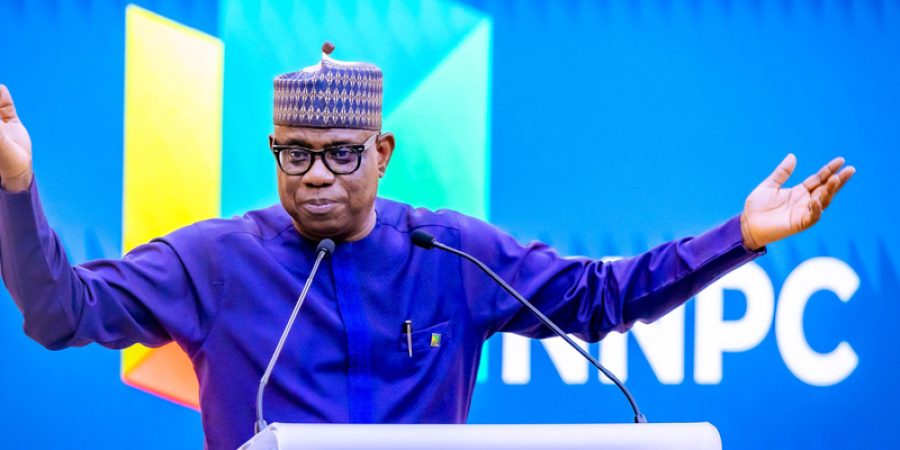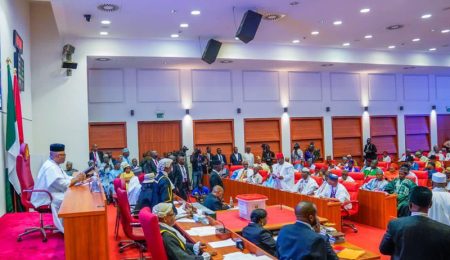After at least three postponements, the 614-kilometre Ajaokuta-Kaduna-Kano (AKK) valued at about $2.8 billion, has hit 86.05 per cent completion, with a new date of November ending set for its mechanical completion by the Nigerian National Petroleum Company Limited (NNPC).
Mechanical completion is a technical term often used in engineering, oil and gas, and construction industries to signify that all mechanical work, including equipment installation, piping, welding, among others, has been finished and is ready for testing or commissioning.
Erstwhile head of the national oil company, Mele Kyari, had initially said the gas pipeline will be ready by December 2023, but it was first shifted to Q4, 2024 and subsequently pushed to Q1, 2025.
Speaking in Abuja on Thursday at the “2025 AKK Pipeline Progress Update and Opportunities Engagement”, new Group Chief Executive Officer of the NNPC, Bayo Ojulari, described the AKK as a milestone in Nigeria’s journey towards energy security, economic revitalisation, and industrial resilience.
Beyond being a piece of infrastructure, Ojulari stressed that the project is a lifeline for economic advancement, job creation, and national integration, highlighting its strategic significance in unlocking the vast gas reserves of Nigeria to power homes, industries, and innovations across the country.
“The AKK gas pipeline is a strategic economic catalyst for Nigeria and is poised to reshape the landscape in so many other ways. First, power generation and industrial growth. The pipeline will supply up to 2.2 billion standard cubic feet of gas per day, fueling power plants in Abuja, Kaduna, Kano, and others.
“This will revive industries, especially in the northern Nigeria where I grew up and I still remember all those industries in those days in Kaduna and all the trips to Kano. Industries are expected to bounce back, creating thousands of jobs.
“For local content, over 1,900 skilled and semi-skilled Nigerians have already been employed directly on the project. Thousands more will be employed once the pipeline becomes operational due to economic spin-offs that will occur all across the sectors,” the GCEO stated.
The project funded by the state-owned oil company, Ojulari said, will also see industrial parks being developed in Ajaokuta, Kano, and others, along the AKK corridor, while catchment areas will not only deliver incremental tax revenue to the government, but also create employment and other ancillary opportunities.
In terms of economic diversification and energy security, Ojulari stated that the AKK pipeline supports Nigeria’s decade of gas initiatives aimed at reducing reliance on oil and expanding gas-based industries, explaining that it enhances energy equality by extending gas infrastructure to the northern region which he said has historically lagged behind in access to energy.
“The pipeline will deepen compressed natural gas adoption for transport, lowering fuel costs and emissions as well as transportation of food from the north to other regions of the country and sub-Saharan Africa,” he said.
According to him, it is expected to support agro-processing industries, improving value chains, and rural economies as well as huge regional integration and export potential and eventually link Nigeria to North Africa, opening transcontinental gas trade routes and economic uplift.
“The pipeline will transport natural gas, which is the cleanest burning fossil fuel, emitting significantly less carbon dioxide and coal or oil when used for power generation. Diesel will be displaced massively with the coming of this pipeline.
“This aligns with Nigeria’s commitment to the gas flare commercialisation programme, which repurposes gas flare for productive use. In short, the AKK pipeline isn’t just laying of steel, it’s ensuring that the good people of Nigeria realise the full benefits derivable from our God-given resources,” he added.
In his presentation, the Executive Director, Projects, Nigeria Gas Infrastructure Company Limited (NGIC), Audu Ibrahim, said the AKK which was officially kicked off in 2020, now has a clear path to delivery in 2025/2026. However, he noted that the mechanical completion will be done by November this year.
“ It will also support the gas-based industries. So you have 1,350 megawatts in Abuja, in Kaduna, and then 900 eventually in Kano… We have a continuity of pipeline from KP303 all the way to Kano. That pipeline is complete. It’s welded. It’s pre-commissioned. It’s tested. It’s ready to receive gas.
“But that’s the second segment…we’ve been able to do quite a lot of creative rearrangement, and then the most critical success factor of the project, which is the River Niger Crossing, has actually been completed. This for us has given us a pathway.
“This has derisked the project and all other outstanding work is visible. So today, overall completion of this project is 86.05 per cent . That’s where it stands, and we’re hopeful that by November 30, we should have the pipeline end-to-end mechanically completed,” Ibrahim stated.
Typical of such humongous projects, Ibrahim listed security threats; difficult terrain, which he described as rocky and the COVID-19 pandemic as part of the challenges, noting that funding was also an issue, wherein the national oil company went outside the country for financing.
“So this is our revised strategy, main line completion is by the end of 2025, and then the terminal gas station, the intermediate pigging station, and the BVSCs (Baseline Verified System Completion) are to be closed by 2026,” he said.
Also speaking, the Executive Vice President (EVP), Gas , Power and New Energy at the NNPC, Olalekan Ogunleye, noted that with the passage of the Petroleum Industry Act (PIA), NNPC is now able to raise funding when needed.
“Funding was a major area of focus. It’s not so much of an issue again, because traditionally, like every corporate organisation, NNPC now can go to the money market and borrow money for bankable projects just based on its profile and based on the commercial credentials of those projects,” he stated.
Emmanuel Addeh
Follow us on:

